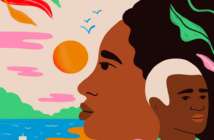Animal and human health are inextricably linked.
Every year Assistant Professor of Pediatrics Ian Michelow, MD, an infectious disease researcher, teaches the parasitology block of the first-year medical curriculum. Students learn that before parasites find their way to human hosts, causing diseases like malaria, schistosomiasis, and toxoplasmosis, many spend a portion of their life cycles in other animals.
After one of these lectures, Alice Tin, MPH MD’18 approached Michelow to tell him about One Health, a concept that acknowledges the inextricable ties between humans, animals, and the environment and encourages the collaboration of physicians, veterinarians, ecologists, and other professionals to address the impacts of those interactions on health care. Intrigued, Michelow gave Tin time in class to tell other students about One Health.
“Parasitology, virology, bacteriology—One Health has links to a lot of these different fields,” Michelow says. “We need to make our approach more unified. We have been siloed, and what One Health does is it puts it all under one umbrella.”
Now, he says, his first-year parasitology lectures will include slides about One Health. Tin, who grew up in Hong Kong, has been aware of the potentially disastrous effects of zoonotic disease since her eighth-grade classes were canceled for several months during the SARS outbreak there in 2003. But it was as a public health graduate student at Tufts, when she took an infectious disease epidemiology course that was cotaught by a physician and a veterinarian, that her eyes were opened to the connection.
“I hadn’t been exposed to that worldview before,” she says. “There are so many other people [in other fields]who are concerned about health. I realized how humancentric my focus on health was.”
Tin started a chapter of Students for One Health at Alpert Medical School and was elected the human health student representative to the One Health Commission board of directors, an international body that meets regularly to educate and engage health and environmental professionals.
“We’re beginning to see that 70 percent of emerging infectious diseases have a zoonotic source. Avian flu, swine flu, SARS, Ebola—all have jumped to humans,” Tin says. “As human populations expand, our land use expands into animal habitats, so it brings us closer together and there are more opportunities for disease spillover.”
To better understand the impact on animal and human populations, Tin says, One Health urges different professions to share surveillance data and prevention or contingency plans with each other. Strengthening these communication channels, she says, could “prevent outbreaks from happening.”
But One Health is not only doom and gloom. Humans’ bonds with animals are in many ways positive, and in ways that benefit our health. “A lot of patients have pets,” Tin says. “It’s a great way [for a physician]to connect with them.” An animal may be a critical source of emotional support, or could help a patient form healthy habits, like a daily walk with the dog. The human-animal bond can affect health care outcomes, she adds: for example, some patients may leave the hospital too soon because they don’t have alternate pet care arrangements.
Students for One Health has hosted speakers from different professions, including the head veterinarian from Roger Williams Park Zoo, and is working to create a clinical elective that would include shadowing a vet. Tin says the group’s collaborative, holistic approach dovetails neatly with Alpert Medical School’s emphasis on interprofessional education. “As we are taught about medicine,” she says, “One Health really is a team sport.”
Watch a video or view a slideshow of therapy dogs visiting Alpert medical students.



